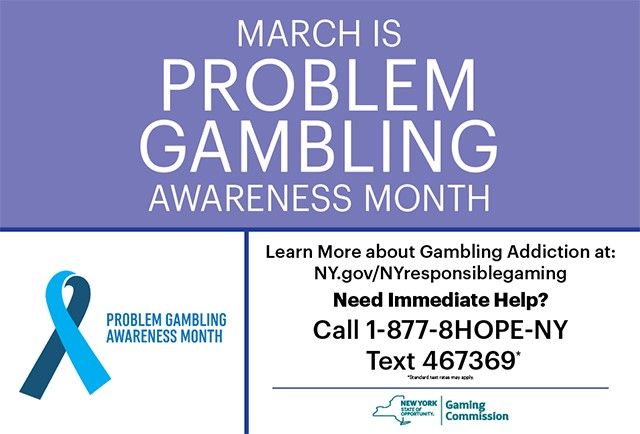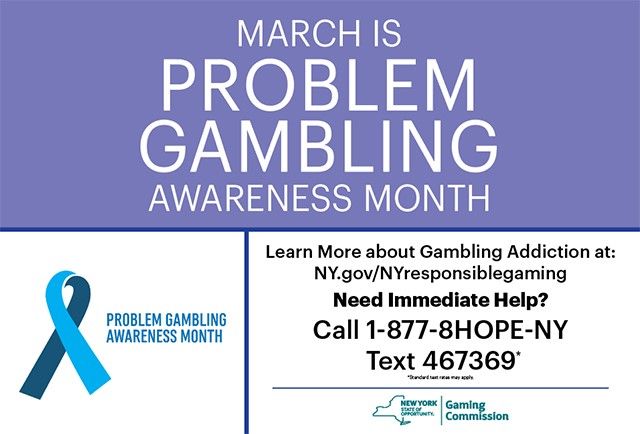Since December, we have been discussing some real-life challenges, such as mental health, substance abuse and addiction. Since substance abuse is considered a form of mental illness, the potential to destroy families is a hard reality. Lacing illegal drugs with Fentanyl has only made the problem worse, and overdose deaths are increasing.
Treating those affected by substance abuse, with or without the co-occurrence of a mental issue, is a major problem for the U.S. healthcare delivery system.
It will take a concerted effort by Government officials and healthcare professionals, assisted by local social work agencies and charitable organizations, to make progress on the front lines.
However, there are other forms of addiction that can be just as harmful as drugs, with the same potential for destruction. According to Recovered.org, gambling is a form of behavioral addiction that is recognized by the American Psychiatric Association.
In fact, gambling addiction can be diagnosed using certain specific criteria. By definition, gambling is a diverse activity that is not limited solely to casinos, which are plentiful. Many other forms of gambling occur in day-to-day life, including lottery tickets and online gambling. Now, legalized sports betting presents yet another convenient method for people susceptible to addiction to lose their earnings.
According to the National Council on Problem Gambling (NCPG), problem gambling affects more than 2% of Americans. For most people, these activities are typically casual and infrequent, and don’t threaten one’s financial security. However, for others, gambling is much more perverse, causing a person to lose control and fall into an addictive impulse-based pattern.
Acting similarly to substance abuse, gambling activates the reward center in the brain and causes the release of dopamine. Pathological gamblers will feel a rush when placing a bet, and may even have a bigger rush when placing large or risky bets. People with a gambling disorder become fixated, building their routine around either chasing the high from winning or desperately trying to recoup their losses. It can be a devastating cycle, one which leaves many in financial ruin. There is also the devastating effect on relationships, including family and friends.
According to a story published in the Washington Post in September 2022, concern over gambling addiction has increased in the wake of the landmark 2018 Supreme Court decision that made legal wagering on games a state-by-state decision.
State governments and professional leagues have embraced the idea as a new source of revenue. Next came the convenient betting apps and an aggressive marketing campaign to promote them.
At this time, more than half of U.S. states now allow some form of online sports betting, with others likely to follow in the next few years. This trend has addiction experts very concerned.
To be fair, professional leagues and certain states have recognized the pitfalls of legalized sports betting and have contributed funds to the National Council on Problem Gambling (NCPG). And the operators themselves, such as DraftKings and FanDuel, have committed resources to helping those in need. It remains to be seen whether more people will become gambling addicts due to legalized sports betting, and whether they can be treated before the condition spirals out of control.
Meanwhile, there are telltale signs of whether someone has a gambling problem.
These include:
- failing to control and limit gambling
- avoiding work or other commitments to gamble
- neglecting bills and expenses and using the money for gambling
- selling possessions to gamble
- stealing money to gamble
- lying about a gambling habit
- taking bigger and riskier bets while gambling
Why is Gambling Addictive?
According to Healthline.com, for some people, the act of gambling causes a reaction in the brain similar to how an alcoholic’s brain responds to a drink. The more you feed the habit, the worse it becomes.
TREATMENT
With the right treatment, gambling addiction is manageable. The objective is to learn how to develop a healthy and reasonable relationship with money. It’s important for a person to quit gambling completely, since even occasional gambling can lead to a relapse. A program of recovery can help one develop impulse control. In general, gambling addiction is treated with similar methods to other forms of addiction.
These options include:
- group or individual therapy
- gamblers anonymous or other 12-step programs
- Medication
- lifestyle changes
It is worth noting that gambling addiction can stem from deeper emotional or avoidance issues. Counseling can help one deal with these underlying issues in order to change self-destructive patterns and the thrill-seeking behavior that is common with addictive gambling. Counseling gives one a place to open up and address these deeper issues.
In some cases, medication can help one overcome their gambling urges. A physician with the proper training can assess whether a gambling addiction might stem from an underlying mental health condition, such as bipolar disorder.
In these cases, one must learn to manage the underlying condition to develop better impulse control to avoid gambling.
As with substance abuse, there are outpatient programs available. Gambling helplines can help the person get started, or a person can reach out to their insurance company for a list of participating programs. The programs can be group sessions or one-on-one therapy. Addicts can continue to live at home and participate in school, work or other daily activities.
Gamblers Anonymous, or other 12-step programs, may help one overcome a gambling addiction. It follows the same model as Alcoholics Anonymous, helping one build a support network with other recovered gambling addicts. You may meet with group members one or more times per week.
Since the potential to lose control of one’s finances is common with a gambling addiction, it may be necessary to turn over financial responsibilities to a spouse or trusted friend until effective treatment is established. The gambler may also need to avoid places and situations that can trigger the urge to gamble, such as casinos or sporting events.
Like any addiction, compulsive gambling can be difficult to stop. It can be embarrassing to admit to, especially since many people gamble socially without developing an addiction.
Overcoming the shame or embarrassment one may feel will be a big step on the road to recovery.
Resources for problem gamblers include Gamblers Anonymous, Debtors Anonymous, and the National Council on Problem Gambling.
Just as social drinking or the use of cannabis can lead to a serious drug addiction, so too it goes with causal gambling.Those with an addictive nature can soon find themselves placing larger and riskier bets, losing their money and then desperately trying to recoup their losses. It’s just a matter of time before the damage spills over to impact social relationships, and impacts one’s financial security. It is best to get help early and stay focused on recovery, even if it means turning over control of your finances temporarily.
With the popularization of legalized sports betting, and the convenience of sports betting apps, experts are concerned that more and more people will become addicted to gambling.
It remains to be seen whether the sponsors of legalized sports betting, professional sports leagues and State Legislatures, will provide sufficient funds to directly assist those that are affected.
Only time will tell, and the full story has yet to be told.






